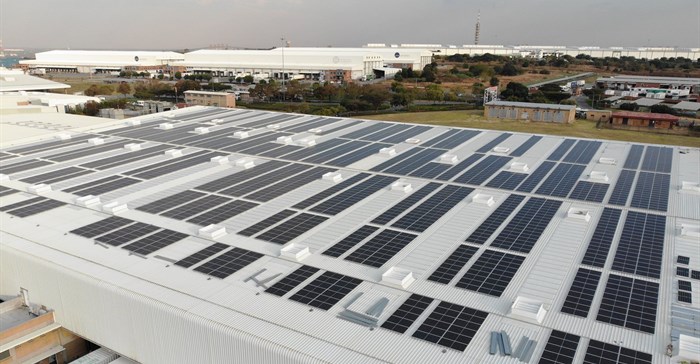The Shoprite Group has nearly doubled its utilisation of renewable energy over the past year, reaching a total of 103GWh, a substantial increase from the previous year’s 54GWh. This was achieved by augmenting the purchase of renewable energy from landlords and other providers by 91%.

Solar PV panels atop the Shoprite Group Centurion distribution centre 2. Source: Supplied
The Group’s commitment to environmental responsibility is further demonstrated by their reduction of electricity consumption by 161PWh, achieved through an LED lamp replacement project. Additionally, their solar-panel installations now span an area equivalent to over 26 football pitches, according to the Group’s CSI and sustainability manager, Sanjeev Raghubir.
In light of the COP28 climate summit in Dubai, Raghubir emphasised the importance of such events, but also stressed the need for proactive action from businesses, governments, civil society, and humanity at large, without waiting for decisions from these summits.
He highlighted the unique challenges faced by Africa, a region that, despite contributing the least to global greenhouse-gas emissions, is disproportionately affected by climate change.
It’s why, Raghubir adds, the Group invests heavily in reducing its carbon footprint across all aspects of its operations, with energy consumption a key priority.
PV investment is paying off
The Group’s solar photovoltaic (PV) facilities now generate enough clean energy to power nearly 4,800 homes for a year, and it is the only African company to have earned a place on the Carbon Disclosure Project Supplier Engagement Leaderboard, for taking action to measure and reduce climate risk within its supply chain in the 2022 financial year.
The retailer’s three-pronged approach includes reducing consumption, expanding its installed capacity of renewables and purchasing electricity in collaboration with independent power producers (IPPs). The next step is to incorporate wheeling.
We’ve increased the amount of electricity we’re buying from landlords and other suppliers by 91%. That’s progress by any measure. The next step is wheeling; buying electricity from an IPP through the existing transmission network.
Achieving that would be a massive step forward, says Raghubir, but will require greater collaboration between various stakeholders to establish a national wheeling framework.
"In the interim, we will continue to improve energy efficiency wherever we can, and to this end the Group has embarked on a refrigeration project. We’ll also continue to install solar wherever it’s viable, whether on rooftops or carports.
“Naturally we’ll watch the negotiations at COP28 keenly, but at the Shoprite Group we’ve set and are pursuing science-based targets to reduce our carbon emissions throughout our operations – in stores, distribution centres and transportation – with a sense of urgency.”







































